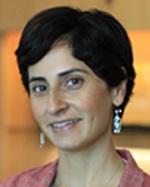- 17 Nov 2014
Transformation and Mobilizations: Migrant-State Encounters in the Gulf
Abstract
In this presentation, Mahdavi looks at what happens when migrants in the Gulf Cooperation Council (GCC) countries encounter the “state” in its various, personified forms. These individual and personified manifestations of the state can include embassy officials, employers, hospital staff, or law enforcement. She argues that these encounters transform both migrants, as well as the states within which they move and live. These new transformations generate micro movements such as the creation of support networks, non-governmental organizations, orphanages and occasionally changes in policy in the Gulf’s largest migrant receiving countries. Migrant-state encounters also present new opportunities for negotiating migrants’ agency while affecting those who present them with challenges and possibilities. Through stories of various dyads and triads that form microcosms between migrants and the state, Mahdavi draws on five years of ethnographic fieldwork to highlight the role of migrants’ intimate lives in producing the micro mobilities and movements brought about by the transformative and productive encounters of migrants and the state. These encounters also present opportunities for migrants to mobilize through their frustrating immobility. The small openings provided, created or forced, and the possibilities of drawing on intimate lives to change the immobilities of others were among the most profound opportunities for many of the migrants and state officials Mahdavi met. Through examining these encounters we have an opportunity to look more closely at migrants’ agency as well as the intricate workings of state power.
About the Speakers

Visiting Senior Research Fellow
Asian Migration Cluster
Asia Research Institute
Associate Professor Pardis Mahdavi is a Visiting Senior Research Fellow in the Asian Migration Cluster of the Asia Research Institute. She is Associate Professor and Chair of Anthropology at Pomona College. She received her PhD and M.A. in Anthropology from Columbia University. Her research interests include gendered labor, migration, sexuality, human rights, youth culture, transnational feminism and public health in the context of changing global and political structures. She is the author of three books: her first book, Passionate Uprisings: Iran’s Sexual Revolution was published with Stanford University Press in 2008, and her second book, Gridlock: Labor, Migration and ‘Human Trafficking’ in Dubai, also Stanford University Press, was published in 2011. A/Prof Mahdavi’s third book, entitled From Trafficking to Terror: Constructing a Global Social Problem was published by Routledge in October 1, 2013.
Associate Professor Mahdavi was chosen as a Young Global Leader by the Asia Society, and has received fellowships and awards from institutions such as Google Ideas, the American Council of Learned Societies, the Woodrow Wilson International Center for Scholars, the National Drug Research Institute, the American Public Health Association, and the Society for Applied Anthropology. She has consulted for a wide array of organizations including the U.S. government, Google Inc., and the United Nations. In 2012, she won the Wig Award for teaching at Pomona College.




